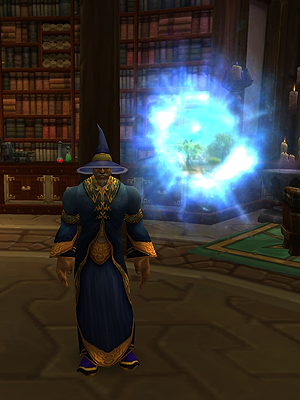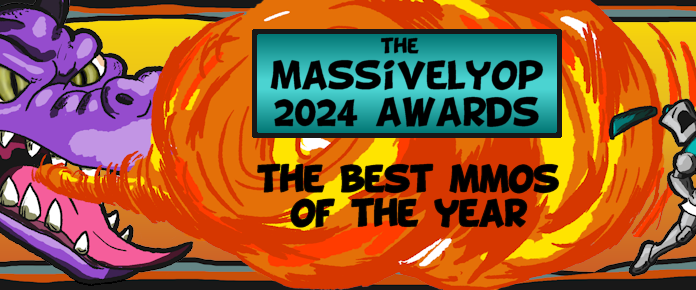
Massively OP’s overview of Rachel Kowert and Thorsten Quandt’s book The Video Game Debate last month was just the beginning of our coverage of the topics contained within it. I advised MMO players and writers to pick up the book and read it for themselves, but for those who don’t, today I’ll break down some of the ideas expressed in various chapters of the book and try to relate them to the world of MMOs specifically.
We’ll be starting with chapter five by Mark D. Griffiths. The topic? Gaming and internet addiction.
 Setting the scene
Setting the scene
Prior to 2000, most research on games and addiction focused on behavioral addiction, mostly through self-reporting or self-diagnosis by those who were perceived to have a problem. This is critical because it’s like looking at a disease based on who has it, not where it came from.
While it can be beneficial to see who has a problem, ignoring the origin of that problem potentially leaves anyone and everyone vulnerable. The studies at the time were rather small-scale, and the criteria were based on pathological gambling criteria. While that may be more valid with today’s lockbox obsessed “free”-to-play games, it didn’t exactly help anyone understand why someone would choose to play Mario Bros obsessively instead of going to the the movies with friends.
Nick Yee‘s work in 2006 is a good example of how research could suddenly pool a larger sample size from a greater variety of people, but there were also more medical tests being done as well as research into visual and mental tests and even patient history. During this time, there were about 60 studies done on game addiction, mostly on MMOs like World of Warcraft and EverQuest.
In short, studying game addiction is still a rather new field, and it’s far from perfect. Online gaming addiction under the suggested name “Internet Gaming Disorder (IGD)” was not even included in the fifth edition of the industry standard Diagnostic and Statistical Manual of Mental Disorders because it’s been so difficult to define.
If it’s not obvious from that sentence, this means that, at the moment, video game specific addiction is not real. You may be addicted to an aspect of gaming, like lockboxes or competitive play, but these are things that you could be addicted to in other settings, like gambling or work addictions.
I’m going to keep talking about it as if it were real since, well, in our culture, people seem to believe it is. While there are clinics that specialize in game addiction, especially in Asia, IGD needs to be proved as something more than a potential culture-bound syndrome. There needs to be valid, cross-culturally relevant symptoms, an identifiable rate of the problem across the world, and an original cause connected with biological features before it can be featured in the Manual of Mental Disorders.
Debating definitions
One of the definitions Griffiths’ chapter in the book explores is that of addiction as an “uncontrollable urge to consume a substance or engage in activities which are harmful to oneself or cause interpersonal problems.” That is, you can do it as much as you like, but when you are choosing to game when making that choice can damage your physical, mental, or social health, it’s a problem. Yes, that means when you blow off talking with your in-laws from out of town, anyone who doesn’t want to sleep on the couch can reasonably say you seem addicted.
To try to be more specific, Griffiths also described addiction in terms of six criteria: salience (cravings, behavioral changes), mood modification, tolerance (having to play more), experiencing withdrawal (not necessarily the shakes, but some sort of physical sign that you’re coping from the loss of something), relapse if the player tries to tone down/quit gaming, and conflict (with friends/family, work, or even within oneself). The idea is that, should someone meet three or more of these criteria and maintain them for 3-6 months, there’s a good chance he or she is addicted.
However, salience, mood, and tolerance are also signs of high engagement, a healthy kind of obsession. For example, I’ve been working pretty hard on an online games education project MOP’s editor-in-chief hinted at back in September. A co-worker who didn’t know about my project was worried about some of my overtime. I’ve been a little more tired than usual (mood), I’ve been more glued to my tablet than usual (salience), and admittedly there’s been a good deal of head smacking (that’s conflict, but mostly with myself). However, this is compared to over the summer when we had almost no work and I was literally in tears over my boredom at work sometimes (there’s only so much research I can enjoy when I know I’ll have no chance to apply it in the near future).
While to an outsider, it may look like a problem, the project is actually something that’s fulfilling in a way my usual work hasn’t been able to satisfy me, and I’ve been able to carry over that enthusiasm into my other work duties. In short, it’s possible to over-diagnose addiction if you use this definition.
This is why “Internet Gaming Disorder” needs to meet specific requirements before it’s considered a real problem. Because there’s no hard definition, it’s difficult to look at how widespread “problematic online gaming” is. There have been some large studies that have tried to pinpoint the issues, but overall, they seem to indicate it’s under 10%.
 Gamer demographics and potential for addiction
Gamer demographics and potential for addiction
This may not surprise anyone, but as Dr. Kowert’s previous research indicated, online gamers tend to play more than offline gamers. This already, sadly, makes us more susceptible to at least seeming as if we have an addiction. However, there are lots of different kinds of MMO players. We can’t just all be lumped together, right?
One thing I really liked about this chapter was that it provided some good data on who the gamers are in at least one large study (4,374 participants), and it gave some big details on MMO fans too! In this study, the mean age was 21; 91% of the participants were male, and 66% of them were single. The average weekly game time ranged from between less than 7 hours (10%) to more than 42 hours (also 10%) with the largest group of gamers (35%) playing 15–27 hours a week. Within this group, 16% of the participants were playing “professionally,” meaning they participate in competitions with prize money. Note, 79% of gamers in this study preferred to a single game genre at a time.
Now, this is cool, but I doubt 16% of all gamers are playing professionally. I’m not sure if the genre number’s true either, since just looking at the writers here at MOP, I know people play several sub-genres of MMOs and even our site covers “barely related” online games because people have a variety of tastes. Still, it’s good to have some of these numbers, especially in a large sample size like this.
Now, this part of the study got interesting. Among online female gamers, MMOFPS games with the lowest, with only about 1% playing them, while 15%-30% played MMORPGs. MMOFPS players were the youngest (18–19.8 years), MMORTS players were usually around 22, and MMORPG players tended to be the oldest (21–27). Again, the sample doesn’t exactly line up with numbers I remember from other research, but the general findings (that MMORPG players tend to be older than MMOFPS and MMORTS players) seem valid.
From there, about half the MMORPG players were employed full time, about 22% were students, and about 15% were homemakers (about 90% of those female). While females were represented in the study, males clearly made up a larger percentage of the group, so it’s assumed that young males are probably the most “at risk” for gaming addiction. It’s suggested that university students may be the most at risk for addiction due to their flexible schedules and good access to high-speed internet connections, as well as the fact that they are adjusting to new social situations and are often removed from their home life for the first time.
However, just from college orientation, we all know there are other addictions to worry about. I didn’t receive a lecture on the dangers of internet addiction at either my junior college or university, but I did get the alcohol one both times. That’s an addiction that’s much easier to identify. After all, no one says, “Dude, I think you’re addicted to parties.” Perhaps rather than the setting, we should look at the delivery of the content, and based on the severity of the results, be able to conclude whether they’re caused by the games themselves or the online portion of them (after all, we still have local multiplayer!).

Addicted to games or the internet?
Are online games innately addictive, or is their connection to the internet the source the addiction, assuming there’s an addiction at all? It’s even been suggested that those who focus on online addiction research should be broadening their research to the internet at large, since it’s one of the providers in shopping, gambling, and porn addiction. It’s even been suggested that a “problematic internet use” be researched and included in the Manual of Mental Disorders. Technically, video game addiction is separated from online gaming addiction, but as of 2013, even general gaming isn’t included.
You could argue that the internet provides situation specific characteristics that can make activities, including online gaming, addictive. Unfortunately, Griffiths’ chapter doesn’t directly tackle what the addiction may be, but another chapter indirectly hints at it: easy access to “pleasure.” As I’ll talk about in a future article, one thing that both the internet and online games can provide people with is an audience. When you do something alone, its meaning feels limited, but when you can share it with others, it feels more significant. Using the internet specifically so that your activities at least seem significant can be pretty rewarding. I’d guess that’s why people will tweet about, say, their breakfast. I usually discuss breakfast only with language students to help them learn unless I (admittedly) want to brag about what I ate or if I realize I forgot to eat it.
However, it’s possible that people aren’t so much addicted to the internet as to their activities on the internet. This would mean there’s possibly a difference between having an addiction to the internet or one on it. To test this, one could potentially use the original six features and simply check how they relate with online vs. offline gaming.
Disconnecting
The Video Game Debate: Unravelling the Physical, Social, and Psychological Effects of Video Games by Drs. Rachel Kowert and Thorsten Quandt is available on Amazon. We’d like to thank Dr. Kowert for providing us with a preprint for this series. Don’t forget to catch up on all of our articles about the book, and stay tuned for more examinations of the chapters most relevant to our MMORPG audience:
 Exploring ‘The Video Game Debate’: Modern online game research
Exploring ‘The Video Game Debate’: Modern online game research
 Exploring ‘The Video Game Debate’: Online games and internet addiction
Exploring ‘The Video Game Debate’: Online games and internet addiction
 Exploring ‘The Video Game Debate’: Moral panic and online griefing
Exploring ‘The Video Game Debate’: Moral panic and online griefing
 Exploring ‘The Video Game Debate’: Games and education
Exploring ‘The Video Game Debate’: Games and education
 Exploring ‘The Video Game Debate’: Cognitive performance and your brain on games
Exploring ‘The Video Game Debate’: Cognitive performance and your brain on games
 Exploring ‘The Video Game Debate’: Social outcomes and online gamers
Exploring ‘The Video Game Debate’: Social outcomes and online gamers
 Exploring ‘The Video Game Debate’: Are MMO communities real or fake?
Exploring ‘The Video Game Debate’: Are MMO communities real or fake?
 Massively OP’s guide to understanding video game research
Massively OP’s guide to understanding video game research
 A Parent’s Guide to Video Games: Condensing ‘The Video Game Debate’
A Parent’s Guide to Video Games: Condensing ‘The Video Game Debate’
 Smart Social Gaming: Why people play social games and other topics non-gamers don’t get
Smart Social Gaming: Why people play social games and other topics non-gamers don’t get
 Gaming behavior scientists gather for ‘Video Game Debate’ panel at PAX South
Gaming behavior scientists gather for ‘Video Game Debate’ panel at PAX South













